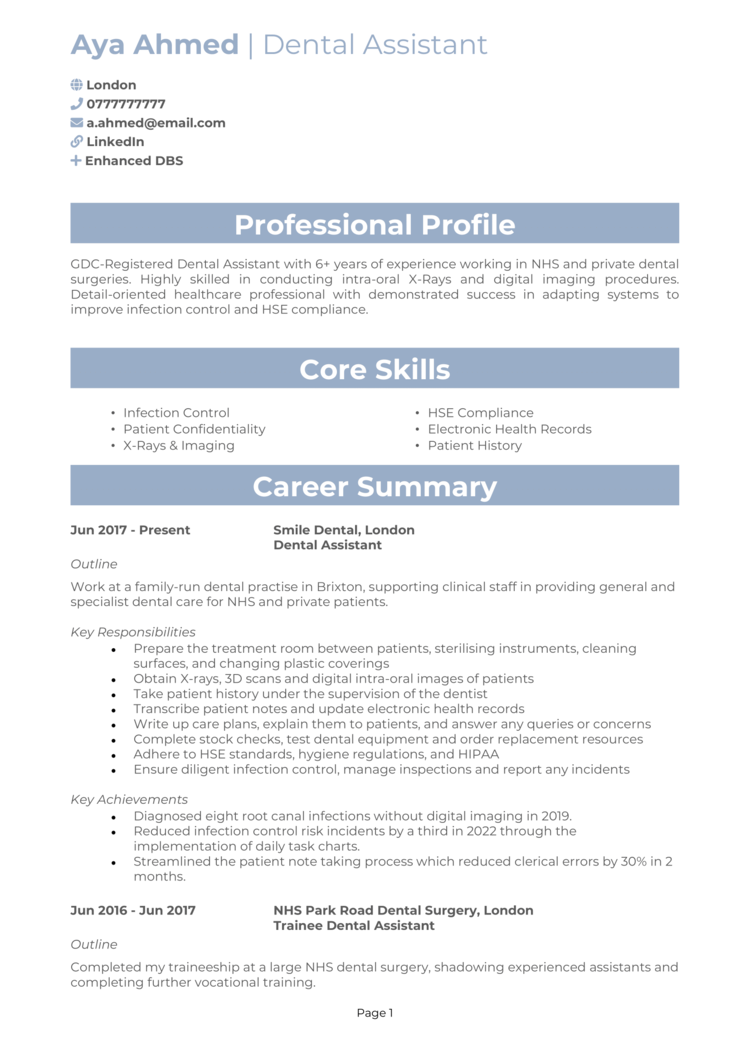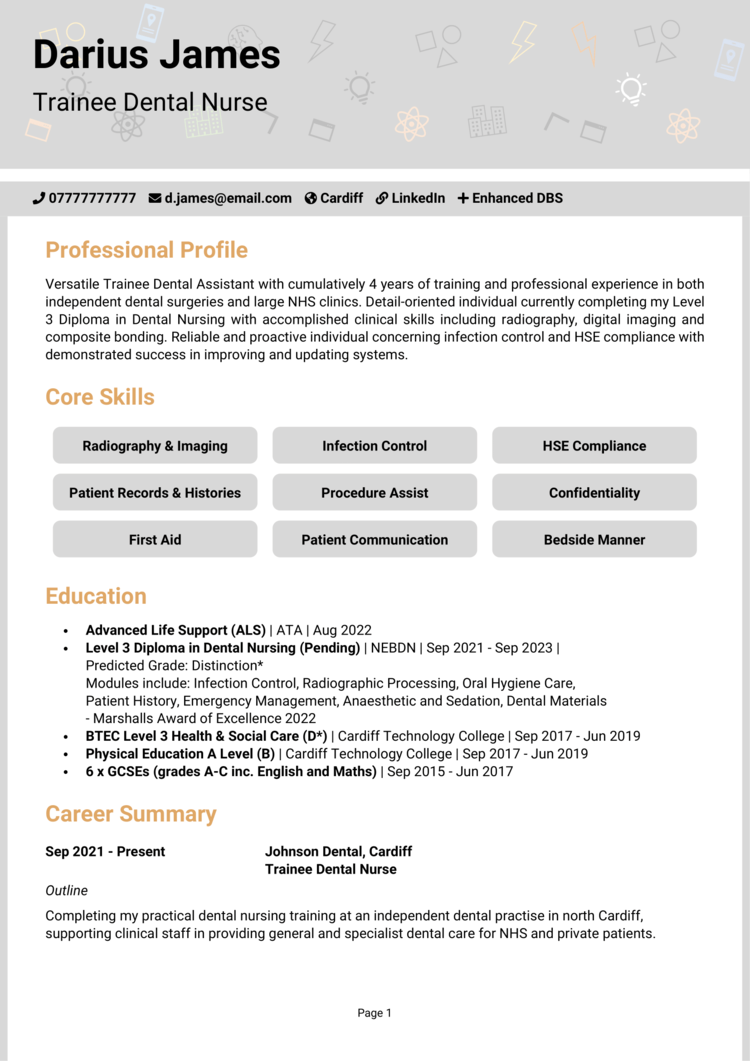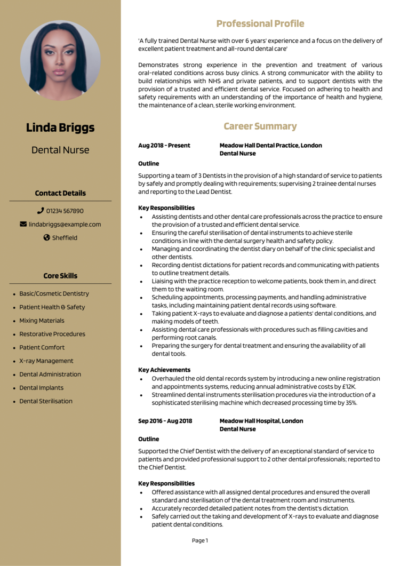As a dental nurse, you’re the glue that keeps the clinic running smoothly – whether it’s assisting the dentist, comforting anxious patients, or making sure instruments are prepped and sterilised.
But before you can step into the surgery, you need a CV that proves you’ve got the skills, experience, and dedication to deliver excellent patient care.
This guide and its Dental Nurse CV examples will help you craft a CV that showcases your dental nursing experience, highlights your qualifications, and positions you as the ideal candidate for the role.
Dental Nurse CV example

Dental Assistant CV example

Trainee Dental Nurse CV example

How to write your Dental Nurse CV
Learn how to create your own interview-winning Dental Nurse CV with this simple step-by-step guide.
A well-structured CV is just as important as a well-prepared dental tray – if it’s cluttered, confusing, or missing key details, it won’t leave the best impression.
To help you land the role, this guide will take you through the essential sections of your CV, from structuring your experience to presenting your technical skills and qualifications in the best light. By the time you’re done, your application will be as polished as a brand-new set of veneers.
Dental Nurse CV structure


Dental practices are fast-paced, and recruiters don’t have time to play detective – your CV should make finding your qualifications as easy as spotting a cavity on an X-ray. Keeping your application’s layout structured and professional ensures your suitability stands out immediately.
Here’s the structure you should follow:
- Name and contact details – Keep personal details and an optional photo at the top so hiring managers can reach you easily.
- Profile – A strong introduction that highlights your experience, skills, and approach to patient care.
- Core skills – Bullet point your key abilities, such as chairside assistance, infection control, and patient communication.
- Work experience – A structured list of your previous roles, focusing on practical experience and key contributions.
- Education – Go through your relevant qualifications and training in dental nursing, from degrees to certificates.
- Additional info – Optionally, list the hobbies and interests, as well as professional memberships and awards, that make you the right fit.
Best format for a Dental Nurse CV


Just like a tidy surgery makes for a more efficient clinic, a well-formatted CV ensures recruiters can quickly find the details they need. A disorganised format full of mistakes won’t reflect well on your ability to handle precision and procedure in the workplace.
Follow these formatting tips:
- Bullet points – Use these to highlight key skills and achievements quickly and clearly.
- Divide sections – Separate parts of your CV logically so it’s easy to navigate
- Use a clear and readable font – Stick to professional and clean fonts, and a sensible colour scheme.
- No more than 2 pages – Keep it a concise length to maintain their interest while still covering all the essentials: save any more for a cover letter.
Dental Nurse CV profile


Your CV profile is the first impression recruiters will get of you, so it needs to be impactful. This short introduction should summarise your experience, skills, and approach to dental nursing, giving hiring managers a clear reason to shortlist you.
Dental Nurse CV profile examples
Profile 1
Dedicated Dental Nurse with three years of experience assisting dentists in general and cosmetic procedures. Skilled in chairside assistance, infection control, and patient care. Proficient in preparing instruments, taking impressions, and ensuring a smooth clinical workflow. Passionate about providing excellent patient support and maintaining high hygiene standards in dental practices.
Profile 2
Reliable and compassionate Dental Nurse with two years of experience supporting dentists and hygienists in busy dental clinics. Skilled in sterilisation procedures, assisting with fillings and extractions, and maintaining accurate patient records. Experienced in reassuring anxious patients and ensuring a comfortable treatment experience. Committed to delivering high-quality dental care and compliance with infection control regulations.
Profile 3
Experienced Dental Nurse with over five years of expertise in assisting with surgical and orthodontic procedures. Proficient in four-handed dentistry, digital X-ray processing, and dental charting. Skilled in working with various dental software, maintaining treatment rooms, and supporting nervous patients. Passionate about contributing to patient oral health and ensuring a seamless clinical environment.
What to include in your Dental Nurse CV profile
To make an impact, you should try to include:
- Your dental nursing experience – Have you worked in NHS practices, private clinics, or hospital settings?
- Technical skills – Chairside assistance, instrument sterilisation, dental radiography, or sedation support.
- Patient care expertise – Highlight how you support nervous patients and ensure a positive experience.
- Organisation and teamwork – A busy practice requires excellent time management and collaboration.
- Additional qualifications – If you have radiography training or sedation experience, mention it here.
Core skills section


Your core CV skills section allows recruiters to quickly assess whether your expertise matches the role. Since dental nursing requires both technical knowledge and patient care skills, ensure this section reflects both aspects of the job.
If the practice focuses on cosmetic procedures, highlight experience with orthodontics or implants. If they prioritise hygiene and infection control, showcase your knowledge of cross-contamination protocols. Tailoring this section to the job advert can make your application stand out.
Key skills that make a Dental Nurse CV stand out
- Chairside Assistance – Supporting dentists during procedures by preparing instruments, handing equipment, and ensuring efficiency.
- Infection Control and Sterilisation – Maintaining strict hygiene standards by sterilising instruments and disinfecting treatment areas.
- Patient Care and Support – Assisting patients before, during, and after treatments to ensure comfort and reassurance.
- Radiography Assistance – Preparing and positioning patients for dental X-rays and processing images under regulatory guidelines.
- Medical History Recording – Updating and managing patient records, medical histories, and treatment notes.
- Stock and Equipment Management – Monitoring and replenishing dental supplies to ensure seamless operations.
- Oral Health Education – Providing patients with aftercare instructions and oral hygiene advice.
- Emergency Response Training – Handling medical emergencies, including CPR and first aid, in compliance with dental practice protocols.
- Regulatory Compliance – Adhering to health and safety regulations, including GDPR and infection prevention policies.
- Team Collaboration – Working alongside dentists, hygienists, and reception staff to ensure smooth clinic operations.
Work experience


Your work experience is what brings your CV to life. While listing skills is useful, recruiters in the UK want to see how you’ve applied them in a professional setting. Whether it’s assisting with procedures, ensuring a smooth patient journey, or keeping everything running behind the scenes, your experience section should show how you make a difference.
Start with your most recent role and work backwards, keeping each entry concise and structured with bullet points. If you’re new to dental nursing, highlight relevant placements, voluntary work, or transferable skills from other healthcare or customer-facing roles.
Writing job descriptions for past roles

- Outline – Introduce the practice, your role, and the type of dental services offered.
- Responsibilities – Describe your key tasks, such as preparing instruments, assisting during procedures, and maintaining hygiene standards. Use power words like “assisted”, “prepared”, and “maintained”.
- Achievements – Highlight your impact, whether it’s improving patient care, enhancing efficiency, or taking on additional responsibilities within the practice.
Example job entries for a Dental Nurse
Dental Nurse | BrightBeams Clinic
Outline
Provided chairside assistance to dentists within a busy private dental practice, ensuring efficient and safe dental procedures while maintaining high standards of patient care.
Responsibilities
- Prepared and sterilised instruments following infection control protocols.
- Assisted with routine and complex procedures, including fillings, root canals, and extractions.
- Recorded patient notes and updated dental charts accurately using dental software.
- Educated patients on oral hygiene and post-treatment care.
- Maintained stock levels and ensured treatment rooms were fully equipped.
Achievements
- Improved practice efficiency by reducing treatment setup times by 20 percent.
- Helped reduce patient anxiety by implementing relaxation techniques.
- Recognised for outstanding infection control practices during a clinical audit.
Dental Nurse | Durham NHS Clinic
Outline
Supported a team of dentists and hygienists within an NHS dental clinic, ensuring smooth patient care, compliance with health regulations, and adherence to high hygiene standards.
Responsibilities
- Assisted with dental treatments such as scale and polish, fillings, and extractions.
- Processed and developed digital X-rays, ensuring accurate diagnosis support.
- Maintained strict infection control measures, sterilising and organising instruments.
- Provided chairside support during emergency dental procedures.
- Handled patient records, booking appointments, and managing clinical paperwork.
Achievements
- Helped improve patient turnaround times by streamlining instrument sterilisation procedures.
- Reduced stock waste by implementing a new inventory tracking system.
- Received excellent patient feedback for friendly and professional service.
Orthodontic Dental Nurse | Perfect Alignments
Outline
Assisted orthodontists within a specialist orthodontic clinic, supporting braces, aligners, and other corrective treatments while ensuring high-quality patient care and comfort.
Responsibilities
- Prepared treatment rooms and set up instruments for orthodontic procedures.
- Took and developed dental impressions and digital scans for orthodontic assessments.
- Provided aftercare instructions to patients for braces, retainers, and aligners.
- Monitored and recorded patient progress throughout treatment plans.
- Managed patient schedules and coordinated with the orthodontic team for follow-ups.
Achievements
- Helped reduce patient wait times by 25 percent through improved scheduling efficiency.
- Supported over 500 orthodontic cases, ensuring accurate tracking of treatment progress.
- Recognised by orthodontists for excellent attention to detail in impression taking.
Writing your education section


Dental nursing requires formal training, so your education should be clearly presented. This section should highlight any degrees, diplomas, or specialist courses that have equipped you with the necessary skills.
Keep the section brief but comprehensive, telling the recruiter what qualification you earned, and when and where you earned it.
Best qualifications for Dental Nurses
- Level 3 Diploma in Dental Nursing – The primary qualification for professional dental nurses.
- National Certificate in Dental Nursing (NEBDN) – A well-respected qualification demonstrating competency in dental nursing.
- Radiography Certificate for Dental Nurses – Essential for practices offering X-ray services.
- Sedation Nursing Training – Beneficial for assisting with sedation-based procedures.
- Cross-infection and Decontamination Certification – Demonstrates strong knowledge of hygiene and infection control protocols.





